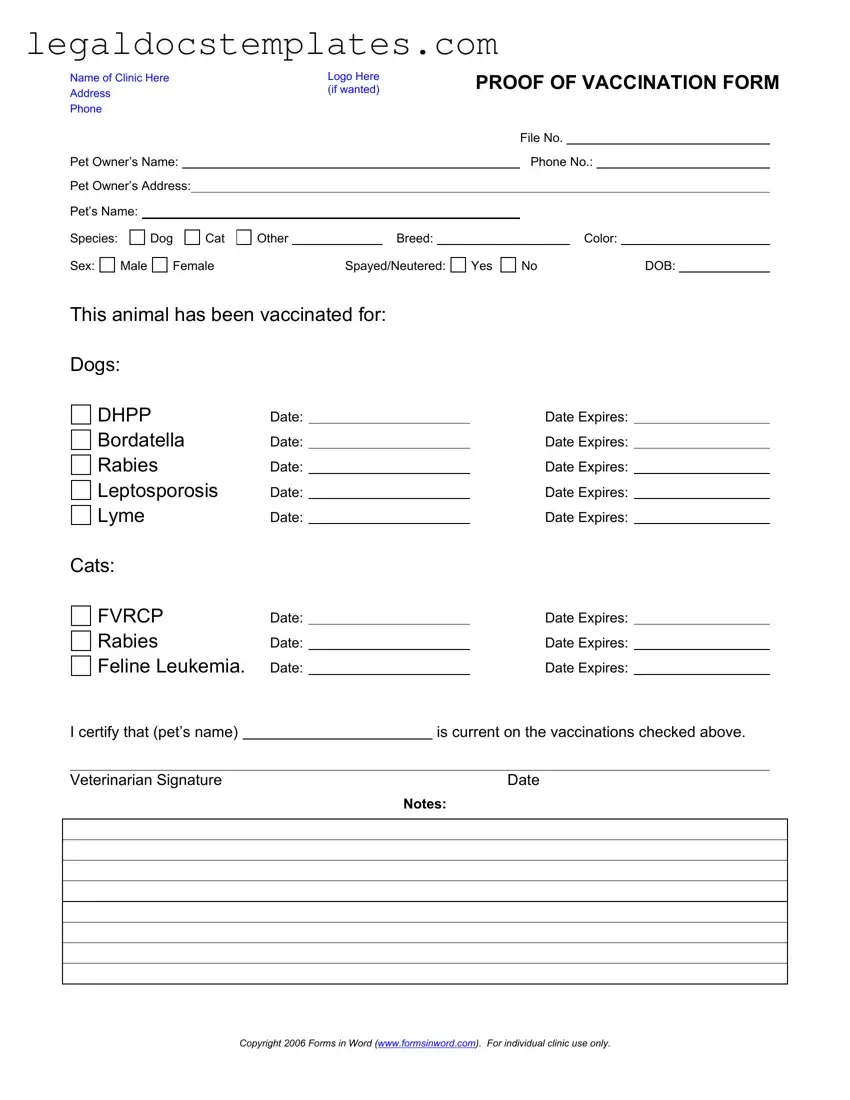The Proof of Vaccination Dog form is closely akin to a Pet Health Certificate. Both documents serve as official records that verify a pet's health status, but they cater to slightly different requirements. While the Proof of Vaccination confirms that a pet has received specific vaccines within certain dates, a Pet Health Certificate typically provides a broader overview of the pet's overall health, often required for travel or breeding purposes. The Pet Health Certificate might also include information on vaccinations, along with a comprehensive health assessment by a veterinarian.
Another similar document is the Rabies Vaccination Certificate. This certificate is a more focused document compared to the general Proof of Vaccination Form, as it specifically records the administration of the rabies vaccine. It includes information on the vaccine's manufacturer, the lot number, and the expiry date of the vaccination. Both documents are vital for pet owners, especially when traveling or in areas where rabies vaccinations are legally mandated for pets.
The Pet Passport is an international travel document for dogs, cats, and ferrets which resembles the Proof of Vaccination Dog form in purpose and necessity. While the Proof of Vaccination Dog form might be used primarily within a country, the Pet Passport is essential for pets traveling across international borders. It includes details of the pet’s vaccinations, especially rabies, and other health records, ensuring the pet meets the entry requirements of the destination country.
In the realm of insurance, a Vaccination Record is akin to the Proof of Vaccination Dog form, especially within pet health insurance policies. This document is crucial for insurance purposes, as it proves the pet has received preventive care. Keeping vaccinations up to date can be a requirement for insurance coverage to remain valid, highlighting the importance of accurately recorded immunizations, similar to what is depicted in the Proof of Vaccination form.
A Veterinary Health Record shares similarities with the Proof of Vaccination Dog form by offering a detailed account of a pet's medical history, including its vaccination records. However, it encompasses a more comprehensive overview of the pet's health, including diagnosis and treatment of any illnesses or injuries, surgeries, and any other medical interventions, alongside vaccination details. It serves as a complete health dossier for the pet, essential for ongoing veterinary care.
A Dog Licensing Form, required by many municipalities, often necessitates proof of rabies vaccination, making it indirectly related to the Proof of Vaccination Dog form. This form not only registers the pet with local authorities but also ensures that the pet meets health and safety standards, primarily through valid rabies vaccination. The licensing process helps in the identification and return of lost pets, as well as supporting rabies control and prevention programs in the community.
Lastly, the Spay/Neuter Certificate holds similarities with the Proof of Vaccination Dog form, particularly in its function of documenting a specific veterinary procedure. Though one focuses on vaccination and the other on a surgical procedure, both certificates serve as proof of responsible pet ownership and care. The Spay/Neuter Certificate is especially important for reducing pet overpopulation and often accompanies requirements or benefits such as reduced licensing fees or eligibility for pet housing.


